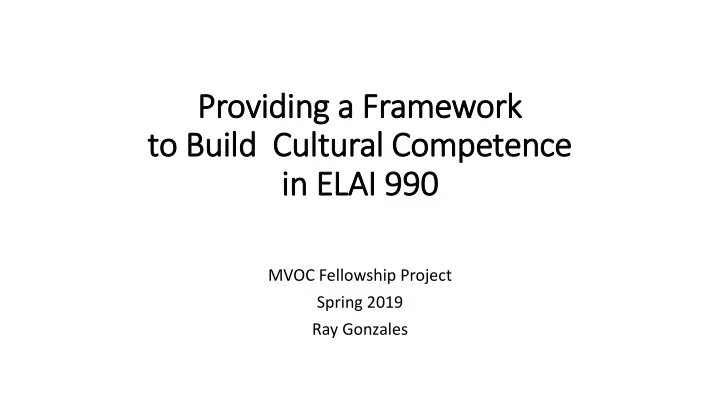

Providing a g a Fram amework k to Build Cultural al C Competen ence e in EL ELAI 990 990 MVOC Fellowship Project Spring 2019 Ray Gonzales
“The Big Idea” In order to understand complex global and cross-cultural issues and interactions, students need an analytical framework to identify the relevant cultural and systemic forces at play in these issues. The concepts of “Deep Culture” (Hall 1976) and global-national systems can be part of such a framework.
The Cultural Iceberg (Hall, 1976)
Deep eep C Cult lture Communication Styles and Rules: personal space eye contact tone of voice conversational patterns Concepts / Notions of: friendship leadership beauty manners courtesy self time roles related to age fairness Attitudes Towards: elders competition vs. cooperation work authority Approaches to: raising children problem solving decision making religion
What students need to do Global Learning Outcomes 1. Explain one’s culture in global and comparative context, recognizing that this culture is one of many diverse cultures and that alternate perceptions and behaviors may be based in cultural differences. 2. Apply knowledge, diverse cultural frames of reference, and alternate perspectives to think critically and solve problems.
What students need to do Global Learning Value Rubric 1. Analyze ways that human actions influence the natural and human world. 2. Identifies and explains multiple perspectives (such as cultural, disciplinary, and ethical) when exploring subjects within natural and human systems.
Human Syst ystems Institutions, Organizations, etc. Beliefs, Laws, People’s Behavior, Attitudes, Policies, Health, Rights, etc. Expectations, Economic Life, etc. etc. Officials, Professionals, etc.
Building Conceptual Knowledge
National al – Global S Sys yste tems A Affecting H Health System Cause/Factor Health Effect Economic: economic sanctions malnutrition • • consumerism __________________ • • __________________ __________________ • • Societal: gender inequality higher infant mortality • • __________________ ___________________ • • Colonial: cultural domination ___________________ • • (e.g. language loss) ___________________ • __________________ ___________________ • •
Aspe pects o of D Deep p Cul Cultur ure i in a n a Society Y You u kno now Well Aspect of Deep Culture Examples The host continues to serve the guest • large portions of food after he/she has cleared the plate. Notions of Courtesy and Even unannounced guests are served Manners (Syria) • tea or coffee and entertained for hours sometimes
Building Language Skills
Language Loss: Key Collocations culture fluent assimilate into identity language of workplace 1. _________ the new society 4. ethnic _____________ 2. predominant ___________ 5. __________ everyday use 3. _____________ speakers 6. ___________ language
Language a e and nd C Cul ulture: e: Collocation S Senten ence A e Asse sembly Instructions: Order the following collocations and phrases to assemble complete and logical sentences. all residents speak the predominant language are obliged to the state religion in some societies and follow the U.S. to teach in the English language only have passed laws obliging schools local governments in some parts of
Putting it Together Readings, Videos • Assignments, Essays •
Readi dings a and V Vide deos t to Introduce Issues Unit 1: What Happens When a Language Disappears? o “History of the Maori Language” o “When Languages Die” (Caplan, Nigel and Scott Douglas, Q: Skills for Success, Reading and Writing, Level 5 , Oxford, 2015) Video: “Cross-Cultural Communication” (Garda, Ilze, TEDx Talk, October 21, 2014)
In In-Class Discussions ns a and J Journal R Responses Questions designed to have students reflect on their current knowledge of the general topics: “What minority people(s) live in a country that you know well? What languages do they speak? Is this language doing well or is it dying? Why or why not?”
Journ rnal R Responses and Es Essays Questions designed to have students analyze topics, issues, problems, etc. using the “Deep Culture” and Global – National Systems Concepts: “As we read in ‘The History of the Maori Language’, the Maori language has been under great pressure over the past two centuries. What global-national systems contribute to language loss?”
Recommend
More recommend